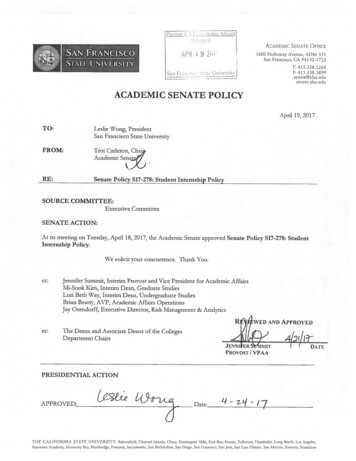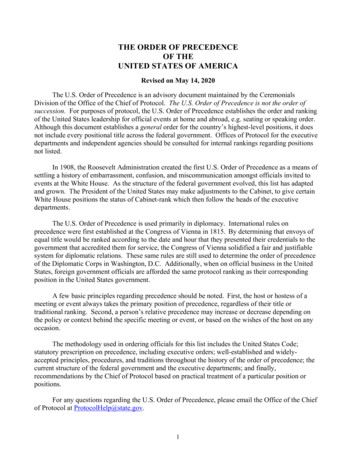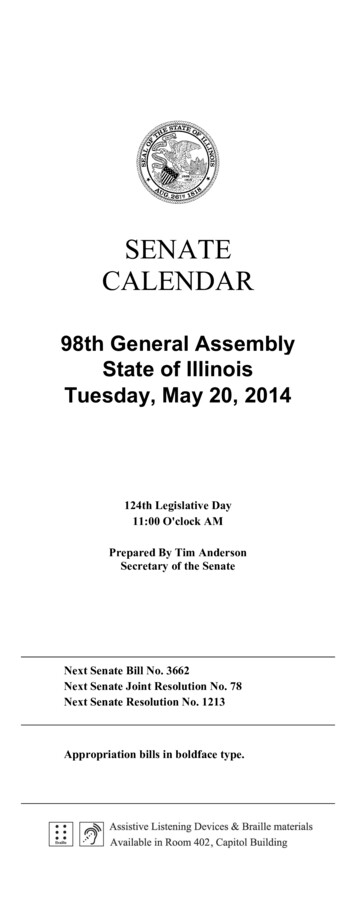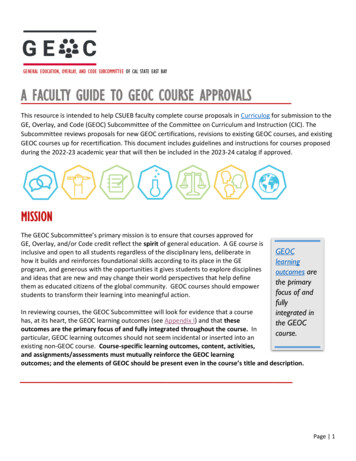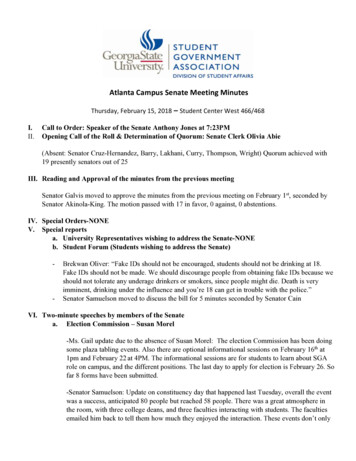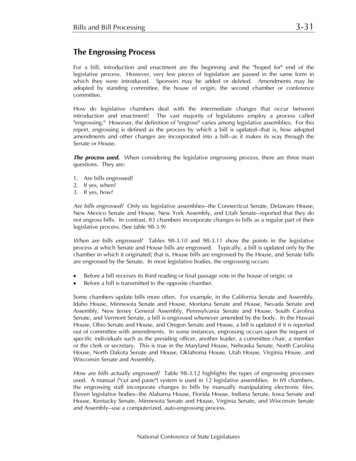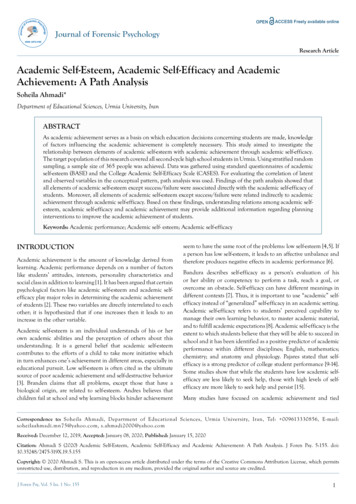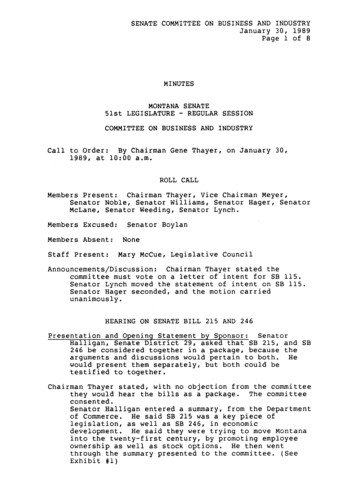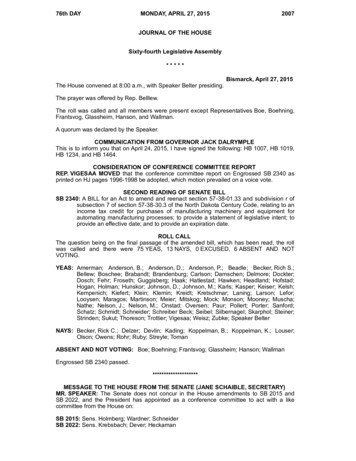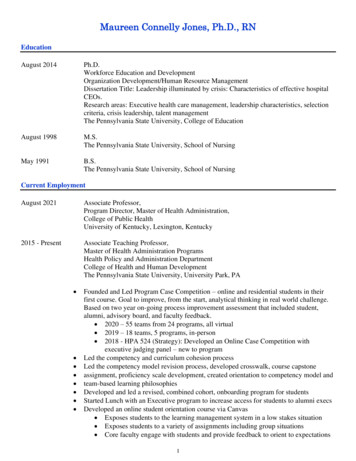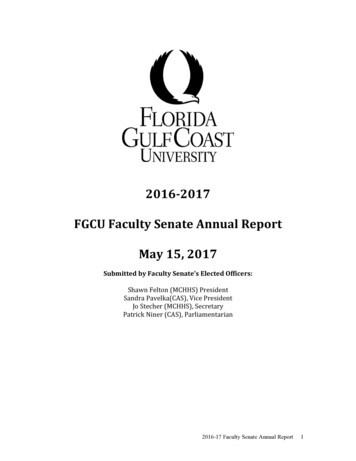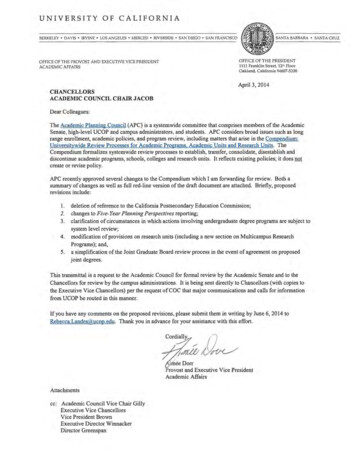
Transcription
UNIVERSITY OF CALIFORNIAOFFICE OF THE PROVOST AND EXECUTIVE VICE PRESIDENTACADEMIC AFFAIRSOFFICE OF THE PRESIDENT1111 Franklin Street, 12 h FloorOakland, California 94607-5200April3 , 201 4CHANCELLORSACADEMIC COUNCIL CHAIR JACOBDear Colleagues:The Academic Planning Council (APC) is a systemwide committee that comprises members of the AcademicSenate, high-level UCOP and campus administrators, and students. APC considers broad issues such as longrange enrollment, academic policies, and program review, including matters that arise in the Compendium:Universitywide Review Processes for Academic Programs, Academic Units and Research Units. TheCompendium formalizes systemwide review processes to establish, transfer, consolidate, disestablish anddiscontinue academic programs, schools, colleges and research units. It reflects existing policies; it does notcreate or revise policy.APC recently approved several changes to the Compendium which I am forwarding for review. Both asummary of changes as well as full red-line version of the draft document are attached. Briefly, proposedrevisions include:1.2.3.4.5.deletion of reference to the California Postsecondary Education Commission;changes to Five-Year Planning Perspectives reporting;clarification of circumstances in which actions involving undergraduate degree programs are subject tosystem level review;modification of provisions on research units (including a new section on Multicampus ResearchPrograms); and,a simplification of the Joint Graduate Board review process in the event of agreement on proposedjoint degrees.This transmittal is a request to the Academic Council for formal review by the Academic Senate and to theChancellors for review by the campus administrations. It is being sent directly to Chancellors (with copies tothe Executive Vice Chancellors) per the request ofCOC that major communications and calls for informationfrom UCOP be routed in this manner.If you have any comments on the proposed revisions, please submit them in writing by June 6, 2014 toRebecca.Landes@ucop.edu. Thank you in advance for your assistance with this effort. j)rl/{/Provost and Executive Vice PresidentAcademic AffairsAttachmentscc: Academic Council Vice Chair GillyExecutive Vice ChancellorsVice President BrownExecutive Director WinnackerDirector Greenspan
Office of the ProvostRecommended Compendium RevisionsApril 3, 2014Background - The Compendium: Universitywide Review Processes for Academic Programs,Academic Units, & Research Units (Compendium) formalizes systemwide review processes forestablishment, transfer, consolidation, disestablishment, and discontinuance of academicprograms at UC. It reflects existing policies; it does not create or revise policy. TheCompendium was first prepared in 1993-94 and has been regularly updated since; it was lastrevised in January 2011.Below is a summary of the next proposed round of substantive revisions, reviewed andrecommended by the Academic Planning Council.1. Deletion of reference to the California Postsecondary Education CommissionThe California Postsecondary Education Commission (CPEC) was the state’s agency forhigher education policy planning and oversight. The agency was eliminated in a lineitem budget veto on June 30, 2011 and closed its doors in November 2011. Accordinglyreferences in the Compendium to CPEC, including review and reporting requirements,are deleted and, where applicable, replaced with references to information gatheringfor state officials or a successor agency.2. Changes to Five-Year Planning Perspectives ReportingThe Five-Year Planning Perspectives (FYPP) section currently specifies annual submissionby the campuses to the Office of the President. The Perspectives detail campus plans toestablish, transfer, consolidate, disestablish, or discontinue undergraduate degreeprograms, graduate degree programs, schools and colleges, and research units. Thefollowing changes are made to FYPP reporting:a. Biennial instead of annual submission – FYPPs are to be submitted in evennumbered years instead of every year.b. Eliminate research unit reporting – Campuses will no longer be asked to includein the FYPPs information on establishment, transfer, consolidation,disestablishment, or discontinuance of research units.c. Eliminate link between FYPP reporting and program review – Currently theCompendium requires contemplated new programs to be listed in the FYPP inorder to be considered for campus and system review. This requirement iseliminated.Summary - proposed Comp revisions, 4/3/14Rebecca LandesOffice of the ProvostInstitutional Research & Academic PlanningPage 1 of 2
3. Clarification of circumstances in which changes to undergraduate degree programsundergo system-level reviewThe section on Undergraduate Degree Programs was revised to clarify the few scenariosin which changes to such programs require system-level rather than campus-onlyreview. For example, system-level review is triggered when a campus seeks todiscontinue a program that is the last of its kind at the campus or the last of its kind inthe UC system.4. Research section changesThe Research Units section was modified to:a. Conform to FYPP changes which eliminate reporting on research units;b. Conform to Regental policy on MRU director appointment authority;c. Clarify the section on Multicampus Research Units (MRUs) (drafted by theUniversity Committee on Research Policy (UCORP)); andd. Add a section on Multicampus Research Programs (MRPs) (drafted by UCORP).5. Joint Graduate BoardUC and CSU have stipulated that Joint Graduate Board review of proposed joint degreesis required only when there are differences in system recommendations regardingproposed programs.Summary - proposed Comp revisions, 4/3/14Rebecca LandesOffice of the ProvostInstitutional Research & Academic PlanningPage 2 of 2
Compendium rev v.15 redlined 20140403Table of Contents (NOTE: page numbers will change in final version.)Preface. 1Introduction . 4I. Campus Five-Year Planning Perspectives for Academic Programs and AcademicUnits, and Research Units . 6II. Academic Degree Programs . 11II.A. Undergraduate Degree Programs . 11II.A.1. Undergraduate/Graduate Hybrid Degree Programs . 12II.B. Graduate Degree Programs . 12II.B.1. Establishment of New Graduate Degree Programs . 12II.B.2. Name Changes of Graduate Degree Programs . 15II.B.3.a. Establishment of New Joint Graduate Degree Programs. 16II.B.3.b. Review/Re-Review of Joint Graduate Degree Programs . 17II.C. Undergraduate and Graduate Degree Programs with Unique Titles . 17II.D. Interdepartmental Graduate Programs. 22II.E. Graduate Academic Certificate Programs . 22III. Academic Units. 23III.A. Departments . 23III.B. Schools and Colleges . 23III.B.1. Establishment of New Schools and Colleges . 23III.B.2 Name Changes of Schools and Colleges . 27IV. Reconstitutions of Academic Programs and Academic Units . 29IV.A. Transfer, Consolidation, or Discontinuance of Undergraduate Programs . 30IV.B. Transfer, Consolidation, Discontinuance, or Disestablishment of GraduateDegree Programs and Graduate Groups . 30IV.C. Transfer, Consolidation, or Disestablishment of Academic Units. 32V. Research Units . 35V.A. Organized Research Units (ORUs) . 35V.B. Multicampus Research Units (MRUs) . 36V.B.1. Establishment of New Multicampus Research Units (MRUs). 37V.B.2. Multicampus Research Unit Leadership & Appointments, AdministrativeOperations, and Annual Reports Procedure for Five-Year Reviews . 40V.B.3. Procedure for Five-Year ReviewsName Changes of Multicampus ResearchUnits (MRUs). 41V.B.4. Name Changes of Multicampus Research UnitsDisestablishment ofMulticampus Research Units (MRUs) . 43
V.B.5. Sunset Reviews of Multicampus Research Units .45.V.B.6. Disestablishment of Multicampus Research Units 45V.C. Multicampus Research Programs (MRPs) .47V.C.1. Funding of New Multicampus Research Programs .47V.C.2. Multicampus Research Program Leadership, Administrative Operations,and Reporting Requirements .48V.C.3. Reviews of Multicampus Research Programs .48VI. Systemwide Academic Units . 49VI.A. Systemwide Schools . 49VII. Accelerated Review Schedule for any Action . 50VIII. Role of the Academic Planning Council . 52IX. List of Appendices. 53Appendix A: Glossary of Terms . 54Appendix B.1: Five-Year Planning Perspectives – Format for description ofanticipated actions . 62Appendix B.2: Five-Year Planning Perspectives – Timeline. 64Appendix C: Format for the Graduate Degree Proposal . 65Appendix D: CPEC – Summary of Commission’s State Program Review PrinciplesAppendix D: State Program Review Principles Appendix D.2: Information Required by CPEC for Academic Degree ProgramProposals . 71Appendix E.1: Review Process Flow Chart – New Graduate Degree Programs. 75Appendix E.2: Review Process Flow Chart – - Name Changes for Graduate DegreePrograms . 76Appendix E.3: Transfer, Consolidation, or Discontinuance of Graduate DegreePrograms . 77Appendix E.4: Review Process Flow Chart – - New Schools and Colleges . 78Appendix E.5: Review Process Flow Chart –: Reconstitutions of Academic Units . 79Appendix F: Systemwide Professional School Planning: Recommended Guidelinesand Model . 80Appendix G: UCOP Policy on Transfer, Consolidation, Discontinuance, andDisestablishment of Academic Programs and Units, 1979 . 85Appendix H: Role of CCGA in the Transfer, Consolidation, Discontinuance, andDisestablishment of Academic Programs and Units . 88
Appendix I: Re-issuance of Memo (#93-4) on University Policy and ProceduresConcerning Organized Research Units, Research Administrative Office, March 12,1993. 96Appendix J: Administrative Policies and Procedures Concerning Organized ResearchUnits (1999) . 112Appendix K: Guidelines for Five-Year Reviews of Multicampus Research Units(MRUs) . 123
PrefaceThe Compendium was first prepared in 1993-94, under the auspices of the AcademicPlanning Council (APC). The APC Subcommittee for Expediting Systemwide ReviewProcesses brought together and formalized a variety of Universitywide review processesand, to the extent possible within the established review framework, instituted changes toincrease efficiency without reducing effectiveness. Subcommittee members strove toconform to, rather than change, existing rules, regulations, and policies. At that time, theAPC Subcommittee adopted concurrent reviews, direct distribution of proposals toreviewing agencies, increased accountability of reviewing agencies, assignment of acoordinator for multiple reviewing agencies, feedback on campuses'’ preliminary plans,preapprovals, separation of extraordinary cases from routine handling, reduced reporting,and use of electronic communications. In addition to streamlining establishedsystemwide review processes, the Compendium formalized other review processes—mostnotably those for transfer, consolidation, disestablishment, and discontinuance actions.In 1997-98, the APC established the APC Ad Hoc Compendium Review Subcommitteeto learn how the campuses and the systemwide office had received the Compendium. .This effort addressed problems identified in the preceding years and improvedefficiencies without reducing the effectiveness of the document. In contrast to earlierreviews, the 1997-98 Subcommittee proposed some changes outside the establishedreview framework. The most significant changes included: elimination of systemwidereview and approval processes for actions involving undergraduate degree programs,departments, and organized research units (ORUs); simplification of the Five-Year Plans(renamed the “Five-Year Perspectives”); and clarification of “simple” name changes forgraduate degree programs and multi-campus research units (MRUs).The 2009-10 review paid renewed attention to large academic planning issues (newSchools and Five-Year Planning Perspective) and budget issues. This focus arose fromSenate’s review of four proposals for new schools during 2007-08 (public health andnursing at UC Davis as well as public policy and medicine at UC Riverside). Anothertheme in this review was reinvigoration—and renaming—of the Five-Year PlanningPerspective. A 14-member task force of faculty, Senate Directors, Senate staff, andcampus administrators, and & systemwide administrators undertook the most recentreview. The group acknowledged the parts of the Compendium that have worked wellover the past ten years, including rigorous reviews of proposed new graduate programs.The review protocol developed by the Coordinating Committee on Graduate AffairsCCGA for this purpose was formalized into this edition of the Compendium.2014 revisions to the Compendium included requiring biennial instead of annualsubmission of Five-Year Planning Perspectives and eliminating research unit reporting inthe Perspectives; clarifying when changes to undergraduate programs require systemlevel review; eliminating references to the California Postsecondary EducationCommission which was defunded in 2011; and clarifying and updating the Researchsections on Multicampus Research Units and Multicampus Research Programs.1
Committees Responsible for Compendium Preparation and Revision1993-94 APC Subcommittee for Expediting Systemwide Review ProcessesChair: Aimée Dorr, UCLA, CCGA ChairArnold Binder, UCI, Academic Council ChairKaren Merritt, UCOP, Director, Academic Planning and Program ReviewDaniel Simmons, UCD, Academic Council Vice ChairMohan Sitlani, UCOP, Coordinator, Program ReviewNeil Smelser, UCB, Special Adviser to the UC Office of the President1997-98 APC Ad Hoc Compendium Review SubcommitteeChair: Aimée Dorr, UCLA, Academic Council Vice ChairCarroll Cross, UCD, UCORP ChairMichael Hanemann, UCB, CCGA ChairRulon Linford, UCOP, Associate Vice Provost for Research and Laboratory ProgramsJanice Plastino, UCI, UCEP ChairDwight Read, UCLA, University Committee on Planning and Budget Vice ChairCarol Tomlinson-Keasey, UCOP, Vice Provost for Academic InitiativesJulius Zelmanowitz, UCSB, Associate Vice Chancellor for Academic Personnel1997-98 Subcommittee of Staff Involved in Systemwide ReviewsChair: Aimée Dorr, UCLA, Academic Council Vice ChairJennifer Lynch, UCOP, Office of Research Assistant AnalystCarol McClain, UCOP, Director of Multicampus Research Planning and ProgramsKaren Merritt, UCOP, Director of Academic Program ReviewMohan Sitlani, UCOP, Principal Policy Analyst for Academic InitiativesLouisa Tapley-Van Pelt, Academic Senate AnalystJeannene Whalen, UC Academic Senate, CCGA Analyst2009-10 Compendium Task ForceChair: Anthony Norman, UCR Divisional ChairJoseph Bristow, UCB Member/UCLACarol Copperud, UCOP, retiredSellyna Ehlers, UCR, Senate Executive DirectorAlison Galloway, UCSC, Vice Provost for Academic AffairsTodd Giedt, UCOP, Senate Associate DirectorMichael Goldstein, UCLA, Divisional ChairKimberly Hammond, UCORP, Member/UCRMary-Beth Harhen, UCSC, Senate Executive DirectorSuzanne Klausner and Hilary Baxter, UCOP, Academic AffairsStephen McLean, UCEP, Member/UCSJoel Michaelsen, UCSB, Divisional ChairKen Rose, CCGA, Member/UCSBClare Sheridan and Eric Zarate, UCOP, Senate Senior Committee Analysts2
2012-13 Academic Planning CouncilChair: Aimée Dorr, UC Provost and Executive Vice PresidentVice Chair: Robert Powell, Academic Council, ChairSusan Carlson, UCOP, Vice Provost – Academic, Personnel Academic PersonnelJoseph Childers, UCR, Graduate Dean, UCRRobin Garrell, UCLA, Graduate Dean, UCLAHarry W. Green, UCAP, Chair, UCAPRalph J. Hexter, UCD, Provost and EVC, UCDWilliam Jacob, Academic Council, Vice Chair, Academic CouncilMichael Kleeman, UCORP, Chair, UCORPJoseph Konopelski, UCSC, Division Chair, UCSCJane Fiori Lawrence, UCM, Undergraduate Dean, UCMChristina Maslach, UCB, Division Chair, UCBMeredith Michaels, UCI, VCPB, UCIJean-Bernard Minster, UCPB, Chair, UCBPRuth Mulnard, CCGA, Chair, CCGADeborah Obley, UCOP, Associate Vice President, – Budget OperationsBarbara Sawrey, UCSD, Undergraduate Dean, UCSDJohn Yoder, UCEP, Chair, UCEP2013-14 Academic Planning CouncilChair: Aimée Dorr, UC Provost and Executive Vice President and ProvostVice Chair: William Jacob, Academic Council, ChairSusan Carlson, UCOP, Vice Provost –, Academic PersonnelRobert Clare, UCORP, Chair, UCORPAlison Galloway, UCSC, Provost and EVC, UCSCRobin Garrell, UCLA, Graduate Dean, UCLAMary Gilly, Academic Council, Vice Chair, Academic CouncilHarry W. Green, UCAP, Chair, UCAPRalph J. Hexter, UCD, Provost and EVC, UCDJoseph Konopelski, UCSC, Division Chair, UCSCTim Labor, UCEP, Chair, UCEPJane Fiori Lawrence, UCM, Undergraduate Dean, UCMDonald Mastronarde, CCGA, Chair, CCGAMeredith Michaels, UCI, VCPB, UCITim Labor, Chair, UCEPJane Fiori Lawrence, Undergraduate Dean, UCDeborah Obley, UCOP, Associate VicePresident –, Budget OperationsJanice Reiff, UCLA, Division Chair, UCLABarbara Sawrey, UCSD, Undergraduate Dean, UCSDDonald Senear, UCPB, Chair, UCBP3
IntroductionThe Compendium presents Universitywide review processes for creating and formodifying academic degree programs, academic units, and research units. It is designedto serve as a manual for the wide range of administrators, faculty, and staff whoparticipate in these processes. Specifically, the Compendium articulates systemwidereview processes for proposals to establish, transfer, consolidate, change the name of,discontinue, or disestablish graduate degree programs, schools, colleges, and researchunits. In addition, it sets forth the Five-Year Planning Perspective process in which e.Each campus annually biennially prepares a list of anticipated academic program actionswhich it and submits it to the Office of the President. Systemwide summaries of theseplans are shared with the California Postsecondary Education Commission (CPEC). TheCompendium also covers a variety of minor topics that sometimes arise with respect tosystemwide review processes (e.g., accelerated reviews, disagreements between Senateand the Administration).Chief among the Compendium’s guiding principles is that academic programs, academicunits, and research units work best when both faculty and administrators support them.All review and approval processes should promote mutual endorsement of any proposedaction. At the same time, the Regents explicitly delegated to the faculty responsibility forcourses and curricula. The faculty, through the Bylaws of the Academic Senate, haveplaced authority for graduate programs with a systemwide committee (CoordinatingCommittee on Graduate Affairs) and authority for undergraduate programs withDivisional committees responsible for undergraduate education (including the approval ofnew courses). Administrators at the campus and system levels retain authority foracademic units and research units. The Compendium processes reflect the delegation anddistribution of faculty and administrative powers on the campuses and systemwide.Compendium processes, most notably the Five-Year Planning Perspective, are alsointended to promote the coordination, synergy, and trade-offs possible when UC operatesas a system of campuses in one university while simultaneously recognizing the vigor andindividuality of the campuses. Intercampus communication and systemwide perspectivesare most valuable early in the campus process of developing a proposal. Compendiumprocesses strive to place each anticipated proposal in the context of UC as a whole and todo so early in the proposal development process.In the previous version of the Compendium (1999), systemwide review processes wereretained for those proposed actions that by their nature involve several campuses (e.g.,creating an MRU), were more likely to have ramifications for other campuses (e.g.,closing a school or college), or required more resources in order to carry them outsuccessfully (e.g., creating a new graduate degree program). In these areas, anticipationof a systemwide review can stimulate a broader perspective during the planning phase,and the review itself can refine the proposed action to integrate well into campus plans aswell as the Universitywide context.4
The Compendium refers to several individuals, committees, and agencies who participatein systemwide reviews. Their roles vary according to their mission, the proposed action,and the type of academic program, academic unit, or research unit involved. In almost allcases, individuals named may act through a designee to carry out routine responsibilitiesrelated to Compendium reviews and processes. A glossary of titles and acronyms used inthe Compendium can be found at the end of the text. The Compendium is divided intofive principal parts:1. Section I covers processes for preparing and distributing information on campusacademic program actions anticipated over the next five years.2. Sections II through VI cover Universitywide review processes for academicprograms, academic units, and research units.3. Sections VII through VIII cover accelerated reviews and the role of the AcademicPlanning Council.4. The Compendium Glossary (included among the appendices) provides explanationsabout the various people, committees, organizations, and terms involved insystemwide review processes.5. Other appendices provide flow charts, details of some review processes, andbackground documents.The heart of the Compendium is Sections II through VI, along with the associatedappendices: Section II covers undergraduate and graduate degree programs; Section IIIcovers Academic Units (including departments, schools, and colleges); Section IV coversReconstitutions (combinations and/or eliminations of two or more major actions as part ofa unified plan by campus proponents); Section V covers Organized and MulticampusResearch Units (MRUs); and Section VI covers Systemwide Entities.The three major types of actions described in these sections are: (1) establishing a newprogram or unit, (2) changing the name of an existing program or unit, and (3)transferring, consolidating, discontinuing, and disestablishing an existing program or unit.(Note that in this version of the Compendium, the campuses are responsible for actionsrelated to makes the final decision for all three types of actions when they involveundergraduate degree programs, departments.), or organized research units. In certaincircumstances, the campus also makes the final decisions about name changes forgraduate degree programs and multi-campus research units.Each portion of Sections II through VI generally has the same format: introductionfollowed by details of the process presented in rough chronological order. Processesoutlined continue to use the efficiencies adopted in the original Compendium and extendthem wherever possible (e.g., through use of email and web sites rather than papertransmission).5
I. Campus Five-Year Planning Perspectives for AcademicPrograms and , Academic Units, and Research UnitsEach Every other year campuses submit to the University of California Office of thePresident (UCOP) Five-Year Planning Perspectives that list the anticipated actions tocreate and/or, transfer, consolidate, disestablish, or discontinue (TCDD) undergraduatedegree programs, graduate degree programs, schools, and colleges, and research unitsORU's and MRU's. Preparing this document gives each With the Perspectives, campuseshave the opportunity to gather information useful to theirits own long-range planningefforts. Collectively, these lists provide the information UC is required to submitannually to the California Postsecondary Education Commission (CPEC). CPEC usesthis information in its annual review of the plans of all three public segments of highereducation (California Community Colleges, California State University, and University ofCalifornia). In addition, integrating lists from all ten campuses allows for systemwideanalysis of academic plans and creates an opportunity to promote coordination, synergy,and specialization. The preliminary picture offered by the Perspectives is especiallyuseful because this systemwide context can prompt valuable discussion valuable in theearly stages of program proposal development.UCOP collects and analyzes Perspectives data, distributes it to select groups, and makesit available on the UCOP website. The Academic Planning Council, selectadministrators, Tthe Senate Divisions, as well as fourand three systemwide Senatecommittees—Coordinating Committee on Graduate Affairs (CCGA), UniversityCommittee on Educational Policy (UCEP), University Committee on Research Policy(UCORP), and University Committee on Planning and Budget (UCPB)—are the primarygroups that provide commentary on the Perspectives. The University formerly submittedcampus Five-Year Planning Perspectives to the California Postsecondary EducationCommission (CPEC). With the disestablishment of CPEC in 2011, UC now providesplanning information upon request to state officials or agency staff (e.g., Governor,Department of Finance, Legislative Analyst).Included with each campus list are short descriptions of those actions (except thoserelated to undergraduate programs) that should be ready for system level review in thenext year or two. Indeed, campus review of a program proposal can begin concomitantlywith inclusion of the program in the Five-Year Planning Perspective. However, proposedacademic programs and units should not remain on these lists longer than three years ifthere is no discernible activity. Proposers must offer a written rationale for a proposal tostay on a campus list beyond this limit if there is no progress within the requisitetimeframe.6
Details of the Process1. Two-Year Reporting Cycle - Five-Year Planning Perspectives are submitted andreviewed biennially (even-numbered years).2. Content (see Appendix B.1.) - Each Five-Year Planning Perspective contains: A list of undergraduate degree programs, graduate degree programs,departments, schools, and colleges for which the campus anticipates anyaction (establish or TCDD, transfer, consolidate, discontinue, or disestablish)within the next five years.1. Include proposals at all stages, whether nascent plans under discussionor fully formed proposals undergoing campus review. The intent is toprovide information about proposals as early as possible in theirdevelopment.2. Cite the number of years each proposal has been listed on thePerspective. No entry should remain longer than three years, or tworeporting cycles, without discernible activity or development. A brief description of each item listed except those related t
UNIVERSITY OF CALIFORNIA . THE PROVOST AND EXECUTIVE VICE PRESIDENT OFFICE OF THE PRESIDENT ACADEMIC AFFAIRS 1111 Franklin Street, 12 h Floor Oakland, California 94607-5200 April3, 201 4 CHANCELLORS ACADEMIC COUNCIL CHAIR JACOB . Accelerated Review Schedule for any Action. 50 VIII. Role of the Academic Planning Council .
